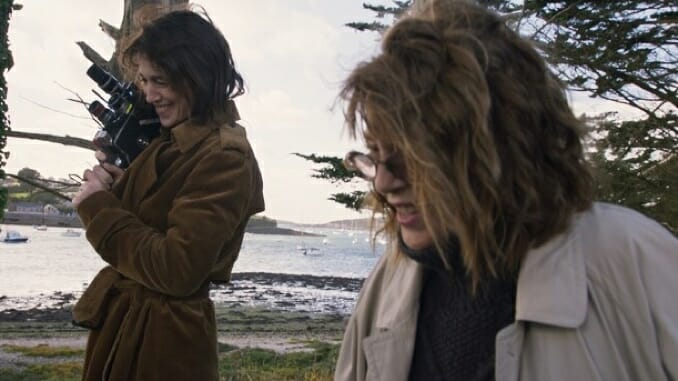Jane by Charlotte Maps Out a Mother-Daughter Relationship Through Hazy Nostalgia

The rocky relationship between a famous mother-daughter duo is gently mended in Jane by Charlotte, an intimate memory portrait that reminisces as much as it reprimands. With actress Charlotte Gainsbourg behind the camera, she finally asks her mother, iconic English-French singer Jane Birkin, personal questions that have previously seemed inappropriate to broach. There’s a particular focus on her mother’s relationship with Charlotte’s father, French singer-songwriter Serge Gainsbourg, who died in 1991. While there is much about Jane and Serge’s relationship that is not discussed in the film—such as unsavory aspects of their marriage or in-depth reflections on addiction—this film is ultimately for the personal catharsis of the titular Charlotte and Jane, repairing a dynamic that from its inception was riddled with awkwardness and alienation. However, this intensely insular connection doesn’t aid the audience in identifying with the lived realities of either woman, an unfortunate oversight that might leave those who aren’t already attuned to this familial drama completely in the dark.
With Gainsbourg having often been cast as the object of the camera’s eye—once serving as a muse to Lars von Trier—it is refreshing to see her commanding the frame from the helm. Even the film’s title expresses the actress’ active pursuit of documenting her mother, emphasizing that it is Birkin’s life that is largely the subject of the film. While Gainsbourg is certainly interested in exploring the nuances of their own relationship, she is just as intrigued by the more mundane aspects of her mother’s life: Why doesn’t she enjoy drinking wine as much as she used to? How does she feel about aging? What breed of dog does she find the cutest? In conversing over the less pressing matters of her 75-year-old mother’s current proclivities, it is easier to access the pain and tumult which had previously been guarded. Yet there’s also a sense of immediate openness on Birkin’s part, as if she had simply been waiting all of these years for Gainsbourg to finally ask her these burning questions. There never even appears to be a discernible rift between the two, as they spend the majority of the film’s runtime patching up misunderstandings and revealing mutual secrets. The bond the two women share with Jo, Gainsbourg’s second child, is easy common ground for them to work off of—a similarity that reflects the differences in how Gainsbourg was raised versus how she raises her children.
The film’s fascination with lineage and legacy becomes even more pronounced when Gainsbourg documents the trio’s decision to adopt puppies—one for Charlotte and Jo to share with their nuclear family, and one for Jane to keep as a companion in her sprawling (if lonely) countryside abode. When the women ask the breeder about the potential health problems each animal could potentially suffer from, it is at first from a place of consumer-savvy scrutiny, but with the gentle kiss of their prospective pet, all of these caveats simply melt away. While the dread over genetic imperfections and future ailments can cloud a caretaker’s judgment, the only tangible emotion that matters in the moment is tender love and affection. It’s alluded here that this is something that Gainsbourg may have felt neglected in having received from her parents during her most formative childhood years, but the transgressions of the past are shelved in favor of meaningful present-day communication, effectively making up for lost time without needing to devolve into finger-pointing and begging for forgiveness. It’s also clear that this exercise is a largely beneficial one for Gainsburg, allowing her to rectify childhood hang-ups while ensuring she does not continue to perpetuate these same mistakes with her own children.
-

-

-

-

-

-

-

-

-

-

-

-

-

-

-

-

-

-

-

-

-

-

-

-

-

-

-

-

-

-

-

-

-

-

-

-

-

-

-

-








































